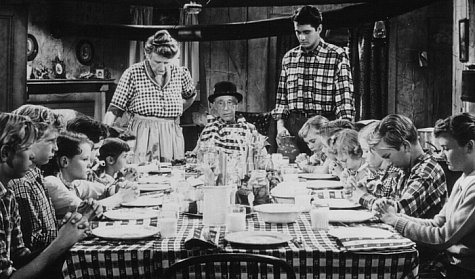 The best-selling Hillbilly Elegy: A Memoir of a Family and Culture in Crisis could just as easily been subtitled How One Crazy Hillbilly Saved Me. Vance acknowledges this much when much of his summary chapter is devoted to the impact that his grandmother had on his life. According to statistics JD Vance should not be living the successful life he is presently living. But some kids, in spite of statistics, make it. One common denominator for these kids who “make it” is that they had a prominent adult in their life outside their nuclear who shaped them. Mamaw was that influence for JD.
The best-selling Hillbilly Elegy: A Memoir of a Family and Culture in Crisis could just as easily been subtitled How One Crazy Hillbilly Saved Me. Vance acknowledges this much when much of his summary chapter is devoted to the impact that his grandmother had on his life. According to statistics JD Vance should not be living the successful life he is presently living. But some kids, in spite of statistics, make it. One common denominator for these kids who “make it” is that they had a prominent adult in their life outside their nuclear who shaped them. Mamaw was that influence for JD.
Sadly, though, many children are taken away from these influential adults because of the structure of our social services systems. Vance explains:
Not everyone can rely on the saving grace of a crazy hillbilly. Child services are, for many kids, the last pieces of the safety net; if they fall through, precious little remains to catch them.
Part of the problem is how state laws define the family. For families like mine—and for many black and Hispanic families—grandparents, cousins, aunts, and uncles play an outsize role. Child services often cut them out of the picture, as they did in my case. Some states require occupational licensing for foster parents—just like nurses and doctors—even when the would-be foster parent is a grandmother or another close family members. In other words, our country’s social services weren’t made for hillbilly families, and they often make a bad problem worse. (242-43)
One of the issues that I have with some of the models of family ministry is that they do not , in my opinion, do an adequate job of addressing the outsize role that some folks have in the life of these children. Yes, ideally, we would love parents to be the primary disciple-makers of their kids. But God has also sovereignly placed “saving graces” in the lives of these children. To not acknowledge them is, I believe, “making a bad problem worse”.
A Helpful Model
This is why I really appreciate the work Timothy Paul Jones does in the area of family ministry. One particular model he uses to explain this dynamic is especially helpful. Jones refers to the Family-as-Church dynamic and the Church-as-Family dynamic. The first one rightly acknowledges that parents are the primary disciple makers for their kids and focuses its energy on training these parents to disciple their own kids. The second model majors on “nurturing members within a rich matrix of multi-generational relationships.” In a very real sense the church takes the place of the family.
Can you imagine what happens in hillbilly culture if a church only acknowledges that first dynamic? What you’ll have are tons of kids who slip through the cracks. If our programs/teaching ministries at church focus on—and in a very real sense depend upon—discipleship happening at home then these kids aren’t going to be reached. For some of these students loving men and women at church will need to be that “saving grace” or to play that “oversize” role. And I’d argue that this is still family ministry. It’s not ideal, but rarely is anything ideal here.
But we are also doing these families a massive disservice if we are not working overtime to help them disciple their kids. We should be striving for seeing parents reached with the gospel and taking on the role of discipling their kids. But we also need to spend a good deal of time working to find the surrogate parents who are playing that oversized role in a child’s life and partnering with him/her. It really is a both/and.
Family ministry is different here because families are different here. The sooner we acknowledge this the sooner we will find models that are both faithful to the Scriptures and are applicable in our given context.
—
Photo source: here
One Comment
Comments are closed.